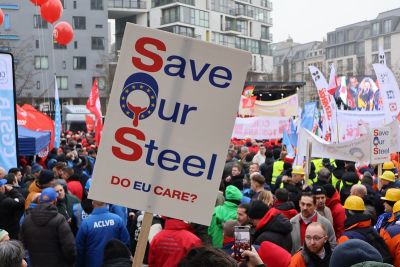The Clean Industrial Deal must include measures to restore workers’ confidence in the green transition, trade union leaders stressed in a meeting with the European Commission today.
At a social partners consultation ahead of the launch of the policy next week, a delegation of union representatives warned workers are losing faith in the green transition as jobs in traditional industries are lost and new green jobs failing to materialise or are of lower quality.
The meeting with Executive Vice-Presidents Ribera, Mînzatu and Séjourné came just two weeks after thousands of workers joined an IndustriAll Europe demonstration for EU action to protect and create quality jobs following the announcement of 100,000 layoffs in recent months.
Asked by the Commission “what key measures are needed to support a just transition and quality jobs?”, the European Trade Union Confederation called for:
- An investment mechanism to support a real European industrial policy and innovation with social conditions attached to ensure public money supports quality jobs and collective bargaining;
- A SURE 2.0 scheme, similar to the one which saved jobs during the pandemic, to prevent irreversible losses in our industrial capacity during a temporary crisis cased by high energy costs;
- A Just Transition Directive that ensures companies proactively plan for change, rather than reacting only when job losses are about to occur, and ensure workers have a right to paid reskilling on work time. This would help fill existing labour shortages in sectors like clean tech.
ETUC General Secretary Esther Lynch said:
“I want to be very clear: unions won’t stand by while workers are losing their jobs. Policymakers have been talking for a long time about a just transition but it has so far failed to materialise. What working people see is well paid, skilled jobs under threat and poor or no green alternatives coming through. The Clean Industrial Deal is the moment to change that.
“A combination of new investment and rights could ensure that we protect Europe’s industrial capacity, and create and safeguard quality jobs. That should include a SURE 2.0 scheme and a Just Transition Directive. We also clearly need to look again at fiscal rules which support the scale of investment needed for a successful green transition.
“The Just Transition Directive would give workers the right to paid time off for reskilling. Without that, we will see a repeat of the Year of Skills in 2023, when we heard nice ideas but we are still nowhere near meeting the Commission’s goal of participation in training.
“Trade unions are behind companies but we also need companies and the Commission to be fully behind our workers. The Clean Industrial Deal cannot just be a plan for one side of the table. All of Europe’s economic success stories are built on real social dialogue and collective bargaining.”
ETUC Confederal Secretary Ludovic Voet said:
“The Clean Industrial Deal needs a Just Transition chapter. At the current rate of industrial job losses, 120,000 to 150,000 jobs could disappear in eight months before we even see the light of a quality jobs package, promised for October at the earliest. The loss of industrial jobs comes with an irreversible erosion of production capacity, making any future recovery more difficult and costly
“Immediate policies are needed to stabilise employment in industry, support workers in transition, and strengthen strategic sectors. Without decisive action, European industry will continue to decline in the face of international competition and upcoming economic shocks. Employment must be a core priority of the Clean Industrial Deal right now.
“Industrial competitiveness will not be fixed by reducing bureaucratic burdens. No administrative simplification will save 11,000 jobs at ThyssenKrupp, or the thousands of jobs in the automotive and battery sectors across Europe.
“In response, a new SURE 2.0 mechanism is needed to protect workers affected by restructurings and support strategic sectors. If we have the budgetary capacity to fund defense, we must also have the capacity to defend our industry and jobs. Failing to act now means accepting an irreversible decline of European industry and massive worker precarity.”
Notes
Photo: EC AV PORTAL – Participation of Teresa Ribera Rodríguez, Roxana Mînzatu, and Stéphane Séjourné, Executive Vice-Presidents of the European Commission, to a social dialogue as part of the Clean Industrial Deal
Letter to the European Commission in view of the publication of the Clean Industrial Deal
ETUC Proposal: SURE 2.0 for Job and Industrial Protection

